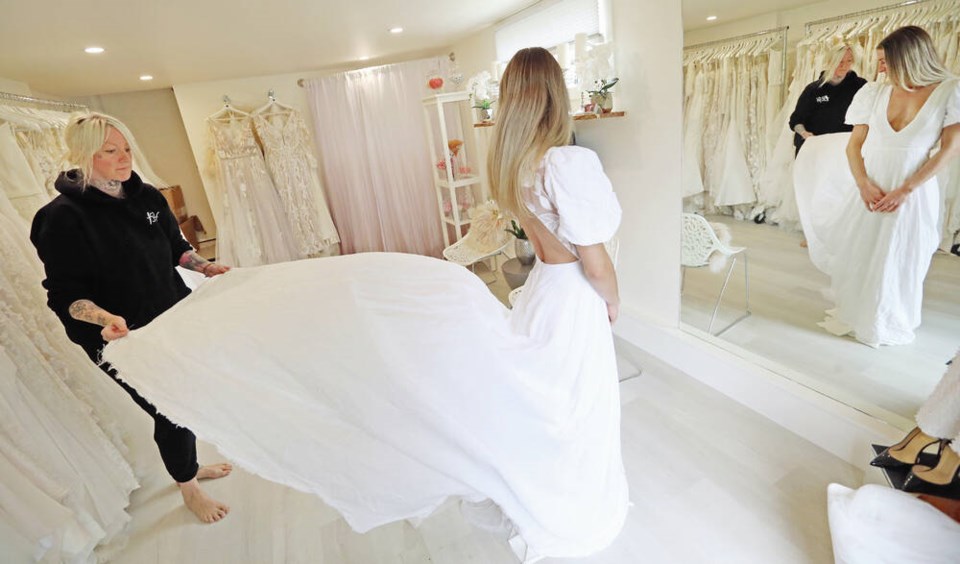Taylor Devito considers herself lucky to be getting married as planned on July 24.
She knows many couples who have had to postpone their weddings not once but twice over the last two years due to pandemic restrictions on large gatherings.
“I knew it was going to be busy, so I booked everything far ahead of time,” said Devito, 29. “I got lucky, because back then, we still weren’t sure how many guests we could invite. We ended up with 75, but I would have invited more people in normal times.”
The wedding industry has been far from normal for the last two years. Some brides and grooms turned to virtual weddings and receptions via Zoom, while others eloped. But many have simply been waiting until they could hold a large in-person event.
That’s meant a busy time this spring for the wedding industry, from planners to dress designers.
“It’s twice as busy as a typical year,” said Barb Walker of French Kiss Events. “I would usually do between eight to 10 events a season — this year I am booked for 18.”
She says that while most wedding planners try not to over-extend themselves, some feel they need to take on more events this year to make up for income lost during the pandemic.
More weddings means more competition for venues.
While the most popular time for couples to tie the knot is between May and October, some are moving their weddings out of that window, and even holding them on weekdays.
“Most couples have a realistic understanding of the circumstances,” said Walker. “Some have changed their wedding day to take place Monday to Friday instead of the weekend, which is what everybody wants.”
Then there’s the wedding dress, which, in some cases, has sat untouched for two years. Some brides are looking for, ahem, adjustments to their unused bridal gowns, while others have changed their minds about the dress entirely as fashions have changed, and want something else.
“Seamstresses are run off their feet,” said Lily Kennedy, a custom gown designer.”It’s been two years, so some don’t fit into their gowns anymore. There are some who have had a baby in the meantime. Our services are booked months in advance.”
Dale Olsen, owner of Outlooks for Men, said he’s seeing his biggest year ever. If you’re looking for a white shirt, good luck.
“For grooms and male guests, it is definitely tough due to supply chain issues,” he said. “Lately, getting white shirts — of all things — is now an issue. I used to able to pick up the phone and get any size I wanted. Not any more.
“With other items, sometimes a shipment is stuck in Vancouver. Sometimes it is production. Stock is two months late, then six months late. Some companies did not survive — we recently lost our shoe supplier.”
Getting stock shipped via air freight instead of by train is sometimes possible, but drives up the cost.
Olsen said he can get men what they need, as long they’re not what he calls the “Saturday morning crowd” — men who come into the store in a panic when they discover the pants they were planning to wear to a wedding “suddenly” don’t fit anymore and are in desperate need of tailoring.
“My tailoring team have never seen it busier,” he said.
Despite the challenges, he said men can still get a custom suit for the big day in between 10 days and three weeks.
For some brides and grooms walking down the aisle this summer, it will be their second time in as many years. Some chose to have a civil marriage ceremony during the pandemic and are now returning for a more public and religious event.
“Between 40 to 50 per cent of the events I am planning this year are postponements over the last two [years],” said Walker, who doesn’t expect the industry to get back to normal until about 2025.
She said that receptions are also trending bigger, part of a new “go big or go home” attitude — in direct contrast to the small events of the past two years
“Having to elope, hold a Zoom or micro wedding are out. Couples are now more comfortable planning for their future.”




